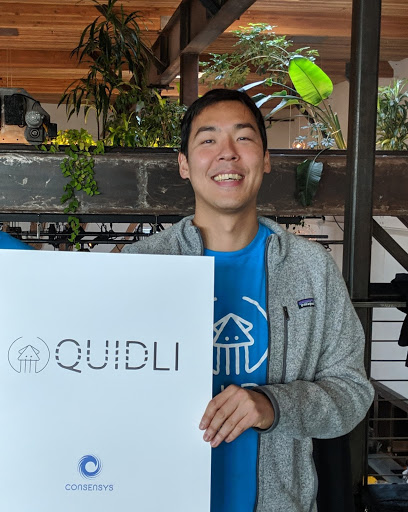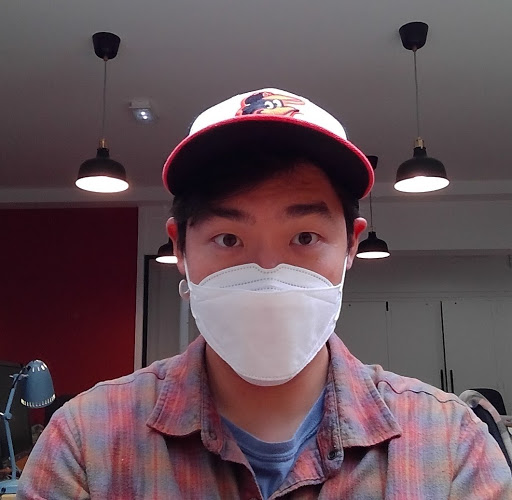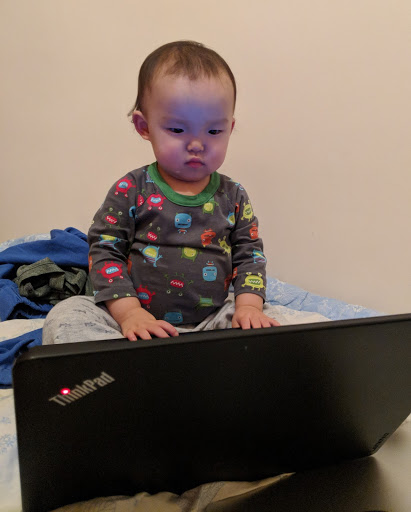1. Hey, can you please introduce yourself?
My name is Justin and I’ve been a Remote Clan member for a couple of months. I enjoy the topic of remote work, RC’s community atmosphere is still cozy, and the founders and community have been a cool source of food for thought in general (i.e. welcome distractions from work).
I’ve been kind of a nomad for the past 13 years, starting work in corporate finance (in Japan, Korea); helping launch and scale three e-commerce startups in Southeast Asia (in Vietnam); working in SaaS and edtech (in France, where I’m currently based), and now launching the biggest venture of my life – a family of four (no idea when I’ll see an RoI on this one).
Today I work on Quidli to help globally remote companies and communities offer crypto-based perks to their distributed team members. Remote workers, who’re often digital natives, deserve to receive perks that are accessible and require little localization, which meshes well with the borderless ethos of crypto.

2. What motivated you to choose remote working?
Actually, it was one of my co-founders who proposed forming a remote company from Day 1. He experienced success with a hybrid setup at his last startup so became a big believer in distributed teams. We’d always been motivated to work with each other – we originally met as MBA classmates. He’s a YC alum, I’m ex-Rocket Internet, we shared interests in startups and bitcoin; so when an opportunity presented itself, we didn’t even think about the logistical challenges. Remote working was really more a byproduct of the partnership we wanted.
3. What were your initial months like? Did it live up to your expectations?
When the team was just the founders, working remotely was fine – we shared a vision, set up the basic work environment (Google Drive, Slack, and Google Hangouts), and knew what our respective objectives were. It basically felt like what starting a tech startup normally feels like, aside from not meeting up in person.
It became more challenging though when we applied an unorthodox method for accelerating development: A work-for-equity system inspired by Mike Moyer’s Slicing Pie (basically, dynamically splitting equity for bootstrapping companies). At its peak, we openly crowdsourced tasks to 30+ different contributors, including developers, business developers, designers, and lawyers from around the world who helped us build an MVP and attract our first set of users, all in exchange for equity (you can actually refer to the resulting cap table). It was really cool to see in action but it took a lot of manual coordination to make this work.
Fortunately, this enabled us to gain enough validation over the course of just a few months so we could attract our first group of external investors, which in turn allowed us to set up a more stable but still very much distributed team structure. And so today, we have team members and contributors based in France, the US, Norway, and Australia.
4. How did you find remote working roles?
I’ve actually never looked for remote working roles prior to my current position. I experienced WFH as an employee, performed freelance work from home (which I guess can be considered remote), and started ventures where we worked out of coffee shops and over emails at the beginning stages. But prior to my current company, I’d never really considered myself a remote worker.
Going forward, however, I can now imagine myself looking for remote working roles exclusively.
5. What have been the best, good and worst aspects of remote working for you?
To me, the best/good aspects of remote working are:
1. Flexibility, having more freedom to work around my personal schedule and needs;
2. connection, being able to find and work with people all over the world based on our needs and their talents, unrestricted by geographies; and
3. timing, because there is definitely an acceleration of the remote work trend happening right now so it’s great to still be “early” in this space as I believe the learnings remote workers are accumulating today will help us build the work environments of the future.

The most difficult aspect of remote working for me are the administrative and bureaucratic obligations that come from having a globally distributed company and team. Depending on how many corporate entities you use and how many different countries you have team members in, you must deal with that much more paperwork, compliance/regulation-related tasks, reporting, filing, etc. And the most frustrating part is these are process-related frictions that existing technology we already use can help with. It’s clear that remote workers and digital nomads are living lives at a much faster pace than our governments and institutions can keep up with.
6. What tools do you swear by while working remotely?
At my company today, our core stack consists primarily of: G Suite (Gmail, Google Drive, Meet), Slack, GitHub, and Notion. These are the basic tools that enable us to manage our company “workspace” and without them it’d be a lot more difficult to function as a remote team.
Also, we’re big dog fooders of Quidli at Quidli – we work on the basis of OKRs and so offer rewards as incentives to hit our objectives as much as possible. It’s a fun way for our team members to gamify our work a bit and earn some crypto for jobs well done.
Adding to those, my personal stack seems to be mostly communication-based these days: WhatsApp, Telegram, KakaoTalk, and Twitter. For work, it’s important for me to be in regular direct contact with my teammates and our partners, so you wouldn’t believe how many different chat apps I have (some apps are exclusively for one person!). And then for my personal life, since I’ve been living overseas for over a decade now, these help me stay in touch better with friends and family. Oh, and I can’t forget coffee. Definitely coffee is a big part of my stack.
7. Your most exciting/ hilarious experience since you started working remotely.
Prior to establishing the core team we have today, my co-founder and I connected with one of the first contributors we worked with on Hacker News. This guy was cool with a remote setup but we flew him out to France from Canada a week later anyways just so we could work together in person for a few weeks – we were fortunate because he turned out to be really awesome! So we continued working together remotely afterwards for about a month before suddenly all moving to live and work together in San Francisco for a couple of months at the request of the first external investor to join us. It really seemed like the fates didn’t want us to work as a remote team during those first few months…

8. What is your golden advice to a new remote worker?
Remote working, like most things, has its advantages and disadvantages. To me, the best way to look at it is as a compromise – “brick & mortar” companies tend to function as highly structured environments that work best under one centralized roof, whereas remote companies are an exercise in flexibility, which comes at the cost of hardcoded work protocols like fixed hours and synchronized work times. But underneath all this, both setups still require alignment in values and mission between companies and workers in order to build overall value.
So having said that, my golden advice to new remote workers is: Embrace the flexibility and be proactive. I imagine most remote companies and organizations are likely to be a works-in-progress, regardless of size and phase. And so, the more you embrace this and add your own processes that deliver results, the more you’re helping to write the playbook and making yourself invaluable. Actually, I think this is just good work advice in general!
9. How do you see your career shaping up and your goals?
That’s a great question. And to be honest, I’m not sure how my career is shaping up!
All I know is, ever since I got my first taste of working at an early-stage startup eight years ago, it’s become really difficult for me to imagine myself going back to a corporate gig. And this startup was also eventually able to make an exit, so it continues to serve as a major motivator for me to try and recreate that journey as a founder myself one day.
And if I do go back to being an employee, remote or not, I’d prefer doing so at smaller organizations. I really like how I can see if my contributions are, or aren’t, effective, and that’s something I never really felt when at larger companies. Having said that, I should clarify, I don’t think corporate careers are bad; I learned many important lessons and have stolen a lot of best practices from my time at large firms that I still use today. It’s just more a personal realization that I like working in smaller environments.
10. How do you expect remote working to evolve in the future?
I’m not really sure. I will say though, it’s always interesting when I chat with non-startup, non-remote work friends and they ask, ‘how’s work?’ and then they’ll have no idea what I’m talking about when I eventually mention the apps and tools I’m using. They’re always amazed at how much work can be accomplished without necessarily having to be in an office or having access to expensive suites of B2B tools. So if there does come a time when remote working in grows even more mainstream, I do think as people who’re already digital natives now, who’re early adopters of technologies that help facilitate more decentralized work structures (which includes crypto), we’ll have advantages in terms of employability and leadership in this regard.
11. Where can we follow you on?
Feel free to follow me on Twitter – https://twitter.com/ahn_going You can also get in touch with me via email – justin@quid.li or keybase – https://keybase.io/jahn716